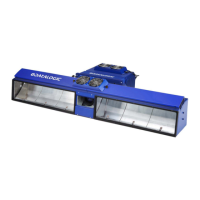Barcode label
A label that carries a bar code and can be affixed to an article.
Barcode reader, reader
A single device that performs two functions: 1. examines a printed spacial pattern (bar code)
and then, 2. decodes the encoded data.
Barcode symbol
A group of bars that represent a character or group of characters whose width and spacing is
determined by a set of rules. In most cases, human readable characters are printed below
the bars.
Bar height
The height of the shortest bar in a bar code.
Bar length
The bar dimension perpendicular to the bar width.
Bar width
The thickness of a bar measured from the edge closest to the symbol start character to the
trailing edge of the same bar.
Baud Rate
A unit used to measure communications speed or data transfer rate.
DPI
DPI (Dots-Per-Inch) refers to the dot or pixel density in a digital image.
EEPROM
Electrically Erasable Programmable Read-Only Memory. An on-board non-volatile memory
chip.
Full Duplex
Simultaneous, two-way, independent transmission in both directions.
Global No Read
When multiple codes are enabled in the Barcode Settings Table, and not all of the codes
are read within a trigger cycle, a single Global No Read message is transmitted to the host.
Host
A computer that serves other terminals in a network, providing services such as network
control, database access, special programs, supervisory programs, or programming
languages.
Interface
A shared boundary defined by common physical interconnection characteristics, signal
characteristics and meanings of interchanged signals.
LED (Light Emitting Diode)
A low power electronic device that can serve as a visible or near infrared light source when
voltage is applied continuously or in pulses. It is commonly used as an indicator light and
uses less power than an incandescent light bulb but more than a Liquid Crystal Display
(LCD). LEDs have extremely long lifetimes when properly operated.

